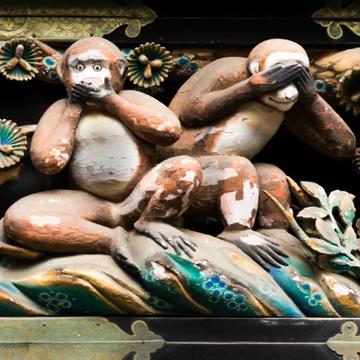
“The Three Wise Monkeys,” Nikkō Tōshō-gū, Nikkō, Tochigi Prefecture, Japan.
This network was funded from December 2021 to June 2022.
The world’s earliest documented erotic poetry, written on clay tablets in the Sumerian language, is extant from a time in which Sumerian literature was being written within a scribal school, copied and engaged with by children being trained in the scribal craft. Though layered with erotic metaphor, much of the language is still sexually explicit. Training material for cuneiform scribes also included incantations, literary texts which formed part of the scientific tradition of Mesopotamia. These healed and protected patients from illness, yet feature violent and sometimes sexual imagery as part of their process. Thousands of years later, child readers in the West continue to encounter originally sexual material in their classrooms. Sexual incidents in Classical mythology have entered the children’s literature lexicon through euphemism; Anglophone students from the nineteenth century onwards have been introduced to their linguistic heritage through bawdy texts such as Chaucer’s Canterbury Tales; French students prepare for the baccalauréat by reading Proust and Flaubert – authors who both shocked contemporaneous readers with their frank depictions of sexuality. Whether in the ancient world or in contemporary classrooms, we can rightly ask why—and how—sexually-charged canonical works interact with translation as well as with the particular needs and objectives of the pedagogical setting.
Translating & Teaching Taboo was an interdisciplinary colloquium that explored the implications of children and students engaging with erotic material in the teaching environment. We hoped to bring our participants’ respective disciplines to bear on the over-arching inquiry outlined above, while also were exploring the cultural specificities and approaches that differentiate how erotic/”taboo” material might be handled in very different geographic, cultural and temporal contexts.
Our discussion topics included: varied approaches to ‘the child’ and ‘the student’ categories of analysis; cultural taboos (or lack thereof) around sex and/in education; changes in meaning of metaphors dependent on the reader; and the processes of adaptation and copying of literature, as well as formulating a methodology and theoretical framework for dealing with this topic. Our end goal was to create an interdisciplinary annotated bibliography that can serve as a foundation document for future researchers in these areas. By sharing cross-cultural and cross-period examples of this phenomenon, we aimed to open a dialogue about how cultures ancient and modern relate to the sexual and erotic language that animates their literary canons.
Our workshops were open to all postgraduate students as well as early-career researchers. For more information and/or to get involved, please contact one of our convenors:
#TeachingTaboo